How to craft an optimized chemist resume
Chemists play a vital role in our society, doing everything from developing makeup formulas to working with extremely hazardous biochemicals. No matter what area of chemistry you work in, your resume needs to reflect your expertise and capabilities as a chemist.
In this guide, we will cover everything you need to know about writing a resume as a chemist. Keep reading to learn about:
- When to use a standard resume vs. a CV as a chemist
- How to write an effective resume summary as a chemist
- Choosing the best chemist skills for your resume
- Optimizing your work experience descriptions as a chemist
- Properly listing your educational background as a chemist
- Carefully selecting the perfect extra sections for your chemist resume
1. When to use a standard resume vs. a CV as a chemist
When you work in a scientific field, such as chemistry, choosing the proper resume format can be tricky.
Openings in science and academia generally require applicants to use a Curriculum Vitae, or CV, format. This is a long-form, multi-page resume that covers the entirety of a professional’s career in great detail. Along with the standard education, work experience, and skills sections, a CV will also include sections such as publications, awards, research, and more.
However, for entry-level positions as a chemist, you may not be required to use such a format as you will not yet have the work history to fill out such a document.
In this case, you will opt for the standard reverse-chronological format, or the alternative functional format. Reverse-chronological resumes focus mainly on work experience, while functional resumes focus on education, skills, and unpaid experience. Choosing between the two comes down to your experience level.
The key to deciding which format to use often lies in the job posting itself. If an employer expects to see a CV, this will typically be noted in the job posting description. Additionally, if the job is in an academic or research-intensive field, these types of positions often require CVs. Otherwise, a standard resume format should do the trick.
Choose your preferred template and make your resume shine.
2. How to write an effective resume summary as a chemist
Your resume summary is like a captivating chemical formula, a potent mixture of your skills and accomplishments that introduces you and your brilliance to potential employers. It's the first reaction they'll have with your resume, so let's create a concoction that leaves them eager to discover more about your talents as a chemist!
In this summary, you should include your most important professional information — such as major accomplishments, key responsibilities held in previous positions, or awards recognizing your expertise and work ethic.
To help illustrate how to write a strong resume summary, check out this weak example followed by its correction and explanation.
Incorrect chesmist professional summary example
Chemist with around 5 years of experience working in research laboratories. Skills include synthetic compounds and chemical analysis. Specialized in applying chemistry for environmental preservation purposes.
Why is this incorrect?
When writing a resume summary, the key is to be as specific as possible. This applicant fails to offer context around the examples of experience they provide, making this summary far less engaging than it has the potential to be.
Corrected chemist professional summary example
Detail-Oriented Research Chemist with 5+ years of experience working as an environmental chemist. Highly skilled in handling synthetic compounds during the testing and design process, as well as performing thorough chemical analyses. Specialized in Green Chemistry, helping previous employer to develop a sustainable cleaning solution that increased cost efficiency by 15%.
Why is this correct?
In this corrected example, the applicant provides much more contextual and detailed information regarding their experience and accomplishments. They put more emphasis on their specialization, highlighting their passion to employers.
3. What are the best chemist skills for your resume
In any scientific field — but especially chemistry where you are working with potentially dangerous chemicals — it is important to have an array of both hard and soft skills to show on your resume.
Hard skills refer to your learned abilities gained through training and educations, while soft skills can be both learned and inherent and deal with how you communicate with other people.
Below, we have provided 10 examples of each of these types of skills that look great on a chemist’s resume:
The most effective technical skills to put on your resume
- Preparing compounds and reagents
- Knowledge of laboratory procedures
- Substance and chemical analysis
- Chemical testing
- Writing technical reports
- Refining substances
- Developing and improving products
- Developing new formulations
- Quality control testing
- Chemical identification
The best chemist interpersonal skills to put on your resume
- Critical thinking
- Problem-solving
- Verbal communication
- Attention to detail
- Collaboration
- Patience
- Leadership
- Organization skills
- Planning
- Delegation
4. How to optimize your work experience descriptions as a chemist
When describing your work experience on a chemist’s resume, it is important to use your descriptions to showcase your best abilities and skills.
You want to show potential employers that you go above and beyond your basic responsibilities, and that you are driven and dedicated to your career as a chemist. It should be a priority to try and include as many specific accomplishments or quantifiable details in your work experience section as possible.
Here's an example of a work experience entry from a chemist resume
Hydro Chemical Solutions, Inc., Birmingham, AL
Chemist
April 2017 to May 2021
- Researched and developed a new water-based cleaning solution that offers a higher-strength cleaning formula for 25% lower production costs.
- Performed quality control testing for 60+ products.
- Managed an inventory of 150+ chemical compounds, assisting in ordering procedures and safe-storage protocols.
5. How to properly list your educational background as a chemist
The educational credentials needed to work a job in chemistry highly depend on the position you are applying for. Chemistry has a wide range of jobs, from entry-level positions that require a bachelor’s degree to formal research positions that require a Ph.D. and various accolades to earn.
When listing your education on your resume or CV as a chemist, make sure to always include the following details:
- The name of your degree
- The name of your school or university
- Your year of graduation
- Notable academic accomplishments
Additionally, you should always list your highest degree first, followed by your lower degrees.
Here's an example of a well-crafted education section on a chemist resume
Education
Stanford University, Stanford, CA
M.S. in Chemistry
2015 to 2018
- Graduated: 2018, Summa Cum Laude
- Concentration: Pharmaceutical Chemistry
University of San Francisco, San Francisco, CA
B.S. in Chemistry
2010 to 2014
- Graduated: 2014, Summa Cum Laude
- Double Major: Chemical Physics and Pharmaceutical Chemistry
- Research Assistant to Dr. Holsworth, Ph.D. in Chemistry
6. How to select the perfect extra sections for your chemist resume
Crafting a chemist resume that stands out from the crowd involves carefully selecting the perfect extra sections to showcase your unique skills and expertise.
As a chemist, you possess a diverse range of talents, and these additional sections can elevate your resume to another level. Consider including sections such as "Publications" to highlight any research papers or articles you've authored, demonstrating your commitment to advancing the field.
"Certifications" can showcase your proficiency in specialized areas, like laboratory safety or analytical techniques.
Furthermore, "Languages" can be a valuable addition, especially if you are multilingual and can communicate effectively in scientific circles around the world.
By thoughtfully selecting these extra sections, you'll transform your chemist resume into a comprehensive portrait of your abilities, making it more attractive to potential employers in the competitive job market.
Here's an example of how to properly list an extra section on your chemist resume
Certifications
Certified Analytical Chemist (CAC) — American Chemical Society (ACS)
- Issued: July 2022
- Valid Until: July 2025
Laboratory Safety Certification — Occupational Safety and Health Administration (OSHA)
- Issued: September 2021
Hazardous Materials Handling Training — National Institute for Occupational Safety and Health (NIOSH)
- Issued: March 2020
Still looking for a job? These 100+ resources will tell you everything you need to get hired fast.


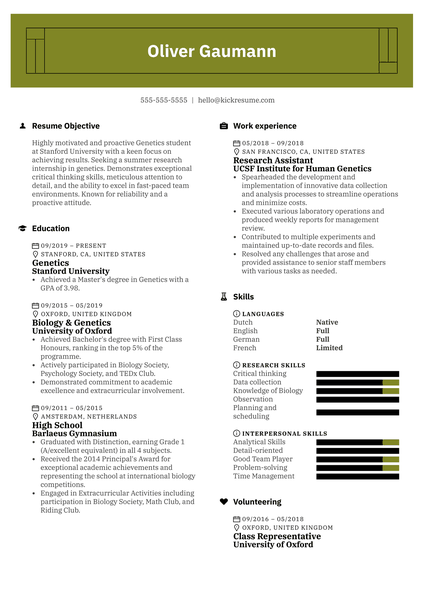
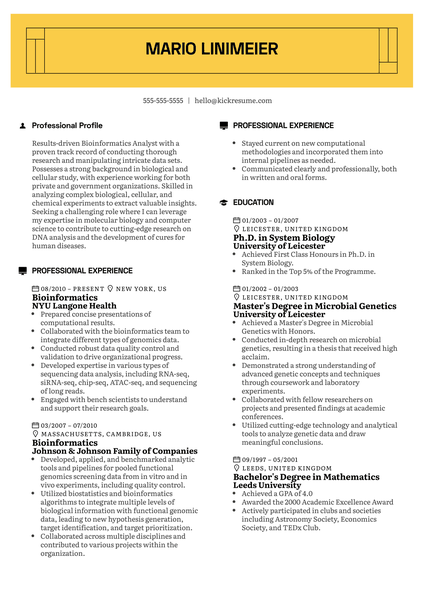
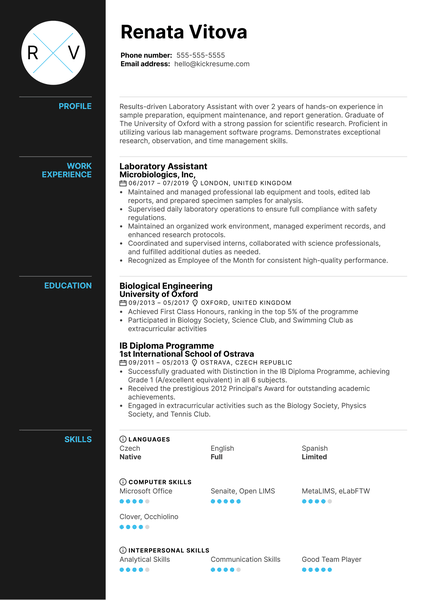
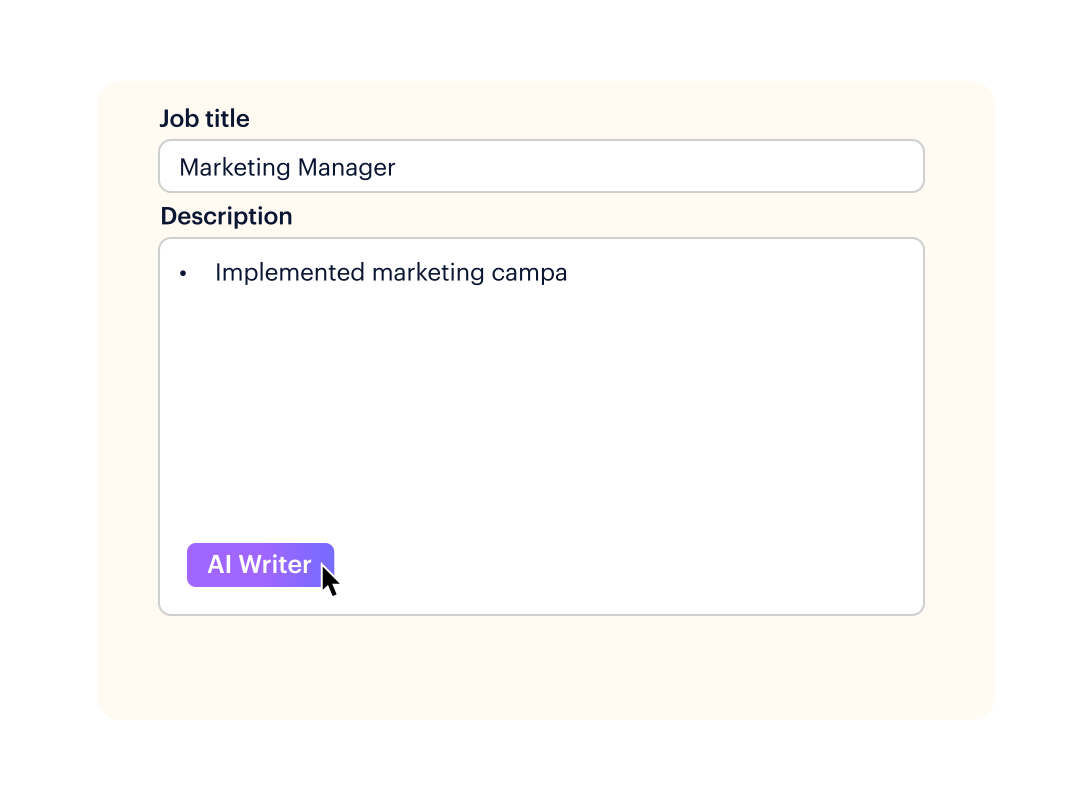

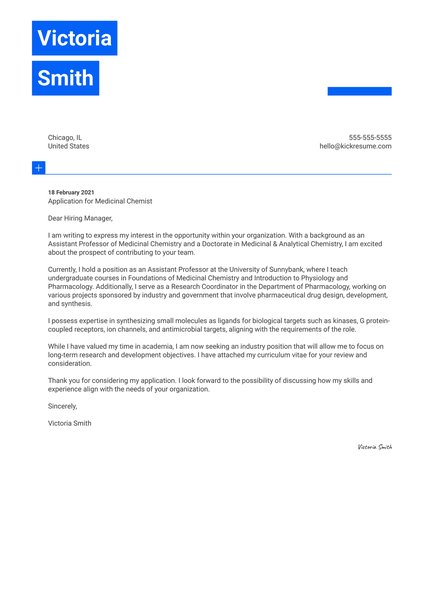
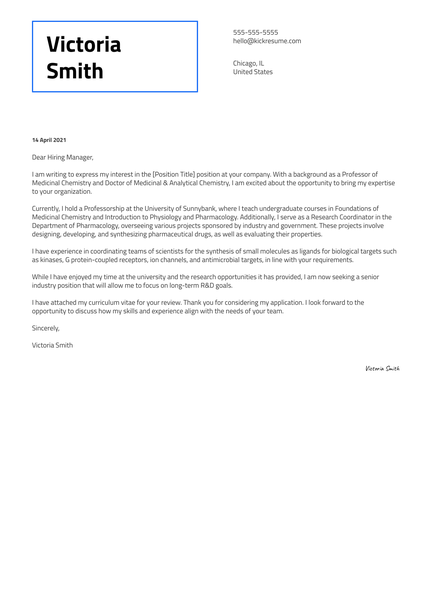
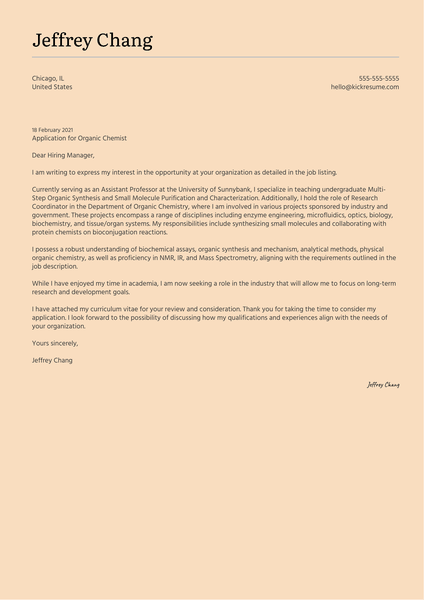

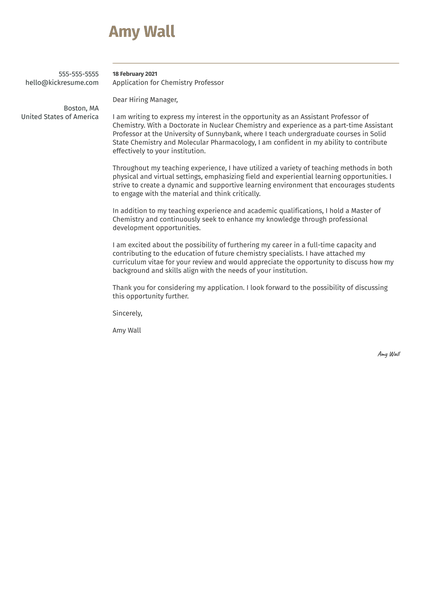

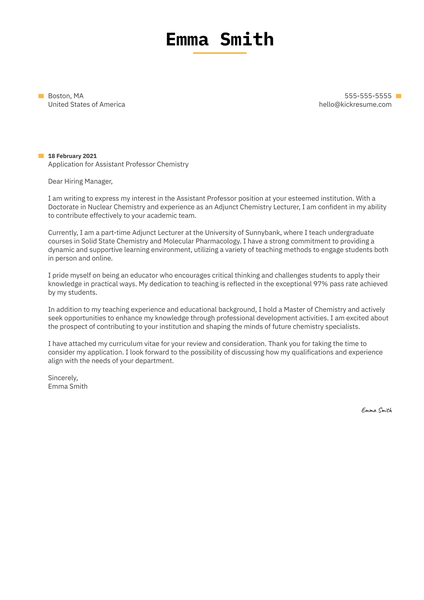
![How to Write a Professional Resume Summary? [+Examples]](https://d2xe0iugdha6pz.cloudfront.net/article-small-images/i-Profile.svg)
![How to Put Your Education on a Resume? [+Examples]](https://d2xe0iugdha6pz.cloudfront.net/article-small-images/i-Collage-Universities.svg)
![How to Describe Your Work Experience on a Resume? [+Examples]](https://d2xe0iugdha6pz.cloudfront.net/article-small-images/Experience.svg)


